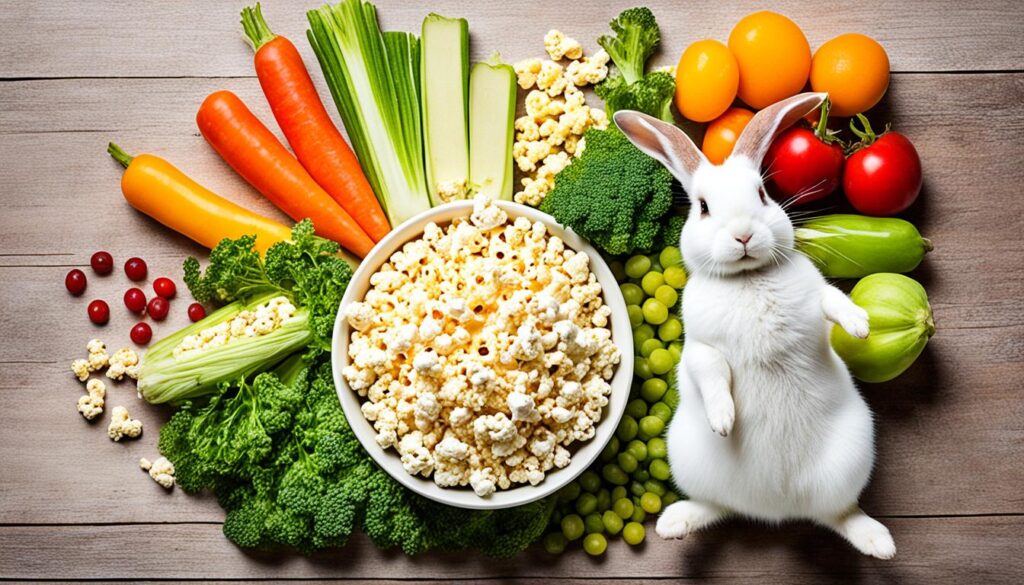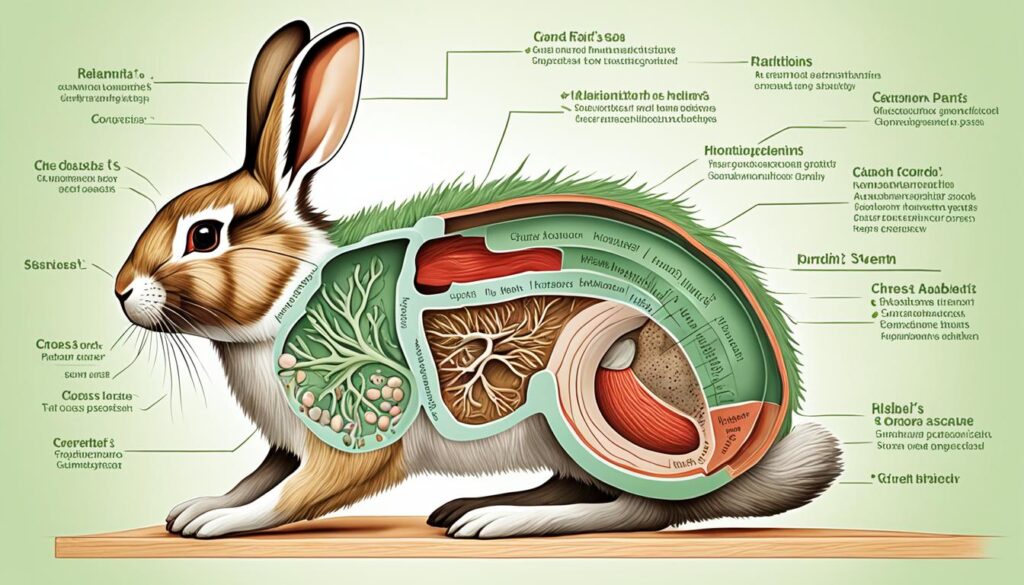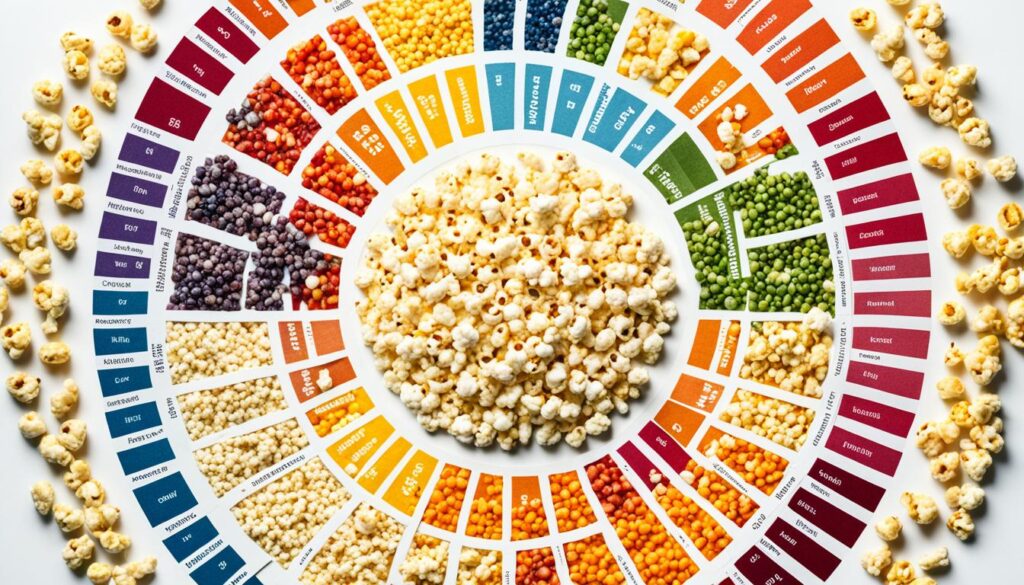As pet owners, we often wonder what foods are safe for our beloved rabbits. One common question is whether rabbits can safely eat popcorn. This guide will examine the nutritional value of popcorn, its risks, and healthy treat alternatives for your furry friend.

Key Takeaways
- Rabbits should not be fed popcorn as it is high in calories, carbohydrates, and unhealthy oils and additives that can harm their delicate digestive system.
- Processed foods like popcorn, chocolate, cookies, and candy should be avoided as they can lead to serious health issues in rabbits.
- A healthy rabbit diet should consist of approximately 80% hay, 10% fresh leafy greens, and a small amount of rabbit pellets.
- Introduce new foods to rabbits gradually and in small amounts to prevent digestive problems.
- Provide a variety of rabbit-safe vegetables and treats to ensure your pet receives a balanced and nutritious diet.
Understanding a Rabbit’s Digestive System
Rabbits have a special digestive system made for their plant-based diet. They are herbivores and concentrate selectors, meaning they mainly eat plants. Their digestive system is designed to break down plant material well.
They need to eat mostly 80-90% hay, like oaten or grass hay. Their small intestine is key for digesting and absorbing nutrients, similar to other herbivores.
Rabbits’ Evolved Diet
Rabbits rely on the right diet and gut bacteria for good health. Their large gut has special bacteria that help break down food. It’s important to feed them a pellet with at least 18% fiber and limit fruits to 2 tablespoons a day.
The Dangers of Indigestible Foods
Rabbits can’t handle foods high in carbs, fats, or hard-to-digest stuff like popcorn. Eating these can cause serious health problems, like a deadly condition called gastrointestinal stasis. Feeding them foods like muesli or popcorn can lead to gut problems and damage.
Overweight rabbits on diets high in carbs are at risk of health issues. They may struggle with vet visits and anesthesia. Some veggies, like lettuce or potatoes, are bad for rabbits and can harm their health.

If rabbits don’t act healthy within 12 hours, they might need a vet. They could need exams and medicine to help them move better. Tiny rabbits might need to be fed through a syringe and given special medicine when changing their diet.
| Feeding Guideline | Recommendation |
|---|---|
| Hay | 80-90% of diet |
| Pellets | At least 18% fiber |
| Fruit | Up to 2 tablespoons per day |
| Greens | 1/2 cup per kg of body weight |
| Avoid | High protein, fat, and sugar foods |
Rabbits that don’t eat their caecum or have hard droppings are at risk of blockages and poor gut health. Changing a rabbit’s diet to a safe one might mean giving them small amounts of familiar food and adding supplements like protein.
Understanding a rabbit’s digestive system and diet is key to their health. Feeding them lots of hay, fiber, and greens while avoiding bad foods is important for their gut health.
The Nutritional Breakdown of Popcorn
Popcorn is a favorite snack for humans but not for rabbits. It has 375 kcal per 100g and 78g of carbs. This can upset a rabbit’s diet balance, causing health problems.
High in Calories and Carbohydrates
Rabbits need a diet high in fiber and low in calories and carbs. Popcorn is not good for them because it’s calorie-dense. A single tub of movie popcorn has up to 1,090 calories, way too much for a rabbit.
Unhealthy Oils and Additives
Many popcorn products have unhealthy oils and additives. Rabbits should eat very little fat, but popcorn has a lot. These fats and additives can cause serious health issues, like fatty liver disease and stomach problems.

Popcorn is not good for rabbits because of its nutritional content. It’s important to give them a diet that meets their natural needs. Sharing popcorn with them can harm their health.
Risks of Feeding Popcorn to Rabbits
Feeding popcorn to rabbits can be harmful to their health. It can lead to a serious condition called gastrointestinal (GI) stasis. This happens when the rabbit’s digestive system slows down or stops working right. Popcorn can cause blockages in the rabbit’s digestive tract because it’s hard to digest.
Popcorn kernels are also a choking risk for rabbits. They can cause breathing problems or even death. Rabbits have a sensitive digestive system. They can’t handle the high carbs and lack of nutrients in popcorn.
Gastrointestinal Stasis
Gastrointestinal (GI) stasis is a serious issue in rabbits. It happens when their digestive system slows down or stops. This can cause gas, blockages, and even organ failure if not treated. Popcorn can make this condition worse in rabbits.
Choking Hazards
Popcorn kernels are a big choking risk for rabbits. If a kernel gets stuck in their throat, it can cause breathing problems and even death. This is especially true for young rabbits or those with dental problems.
In summary, popcorn is not safe for rabbits. Vets advise against giving it to them because of the risks. It’s best to feed rabbits a diet made for their needs to keep them healthy and happy.
Can Rabbits Eat Popcorn?
Popcorn is not a good choice for a rabbit’s diet. Rabbits have special digestive systems that can’t handle the high calories and unhealthy fats in popcorn.
But, you can give them a little bit of plain air-popped popcorn sometimes (1-2 kernels, 2-3 times a week at most). Flavored and microwave popcorn are not safe because they have too much sugar and carbs. It’s best to wait until they are at least 6 months old before giving them popcorn.
Popcorn isn’t great for rabbits nutritionally. It has 375 calories, 4g of fat, and lots of carbs, but not much protein. Rabbits can’t digest grains like corn well. Eating popcorn can cause serious health problems, like stomach blockages and choking, which can be deadly.
So, it’s best not to give popcorn to rabbits at all, except for a little bit of air-popped kind, very sparingly. Give them fresh veggies and some fruits instead for a better diet. Taking good care of your pet means feeding them right for their health and happiness.
What If My Rabbit Accidentally Ate Popcorn?
It’s best to keep popcorn away from rabbits, but sometimes accidents happen. If your rabbit ate a bit of plain, unsalted, and unbuttered popcorn, it’s unlikely to be a big deal. But watch for signs like less eating, feeling tired, or loose stools.
Monitoring for Adverse Effects
If you see any worrying signs or if your rabbit ate a lot of popcorn, get vet help fast. Popcorn isn’t great for rabbits because it’s mostly carbs and fiber. A little bit of plain, air-popped popcorn is okay sometimes. But salted popcorn can be bad if eaten too much because of the salt. Buttered popcorn can cause pancreatitis if eaten too often.
When to Seek Veterinary Care
If your rabbit ate popcorn with onions or garlic, or if it’s moldy, see a vet right away. Eating too much popcorn can make rabbits fat and cause stomach problems. Too much fat from buttered popcorn can also make them obese and cause pancreatitis. And, popcorn can make rabbits dehydrated if they don’t drink enough water. Whole popcorn kernels can also choke them.
To sum up, a little bit of plain, unsalted, and unbuttered popcorn won’t hurt your rabbit much. But watch their health closely and get vet help if you see any bad changes or if they ate a lot of popcorn. Keeping your rabbit on a healthy diet is key for their health.
Healthy Treat Alternatives for Rabbits
Popcorn might seem like a good snack, but it’s not great for rabbits. Luckily, there are many tasty and healthy treats you can give your rabbit instead. Fresh fruits are a great choice because they offer vitamins, minerals, and fiber safely.
Fruit Options
Rabbits can have a mix of fruits like apples, bananas, blueberries, grapes, mango, peaches, raspberries, and strawberries. These fruits are not only safe for rabbits but also add variety to their diet. It’s important to introduce new fruits slowly and watch how your rabbit reacts to them.
Leafy greens and other veggies are also great treats for rabbits. A varied diet keeps your rabbit happy, healthy, and content.
| Fruit | Serving Size (per 6 lbs. of body weight) |
|---|---|
| Apples | 2-4 tablespoons |
| Bananas | 1-2 tablespoons |
| Blueberries | 2-4 tablespoons |
| Grapes | 2-4 tablespoons |
| Mango | 2-4 tablespoons |
| Peaches | 2-4 tablespoons |
| Raspberries | 2-4 tablespoons |
| Strawberries | 2-4 tablespoons |
Remember, fruits are nice treats but should be given in small amounts. They should be part of a diet that includes lots of hay, grass, and leafy greens. Offering your rabbit a variety of healthy foods supports their health and happiness.
Responsible Pet Ownership and Diet
As responsible pet owners, we must ensure our rabbits’ well-being and health. This means giving them a balanced diet that doesn’t include harmful foods like popcorn. By knowing what rabbits need nutrition-wise, we can help them live long, happy lives.
Rabbits need a diet full of fiber, with lots of high-quality hay and fresh veggies. Good nutrition keeps them healthy and stops stomach problems. Also, treats should be given in small amounts to avoid weight gain and other issues.
Rabbits are very delicate, so we must be careful with their diet. By focusing on their nutritional needs, we help them live happy lives.
Being a responsible pet owner means more than just the first excitement of having a rabbit. It takes research, preparation, and a commitment to their care. With a balanced diet and careful attention, we can build a strong bond with our rabbits. This benefits both our pets and us.
Conclusion
Rabbits should not eat popcorn because it’s bad for their health. Popcorn is full of calories, carbs, and unhealthy fats. These can cause serious stomach problems and even choking hazards. It’s important to feed our rabbits the right foods, like hay, fresh veggies, and a little bit of pellets.
Knowing what our rabbits need helps us give them healthy treats, like fresh fruits. A low-carb diet is key to avoid obesity and health issues. Fresh veggies are important for good digestion and staying healthy. Also, hay should be a big part of their diet, and pellets should be given slowly to avoid stomach problems.
By focusing on a balanced diet and avoiding dangers like popcorn, our rabbits can live happy, healthy lives. They need a diet of mostly hay, with some fruits and veggies. Popcorn can make them stop eating hay, leading to malnutrition and health problems. It’s our job as pet owners to give our rabbits the best care and nutrition.
Related Read More: CAN RABBITS EAT BLACKBERRIES? A SAFE TREAT GUIDE
FAQ
Can rabbits eat popcorn?
No, rabbits should not eat popcorn. It’s high in calories and carbs. It also has unhealthy oils and additives that can harm their sensitive stomachs.
What are the risks of feeding popcorn to rabbits?
Popcorn can be dangerous for rabbits. It can cause a serious condition called GI stasis. This happens when their digestive system slows down or stops working right. Also, popcorn kernels can be a choking hazard.
What should I do if my rabbit accidentally ate popcorn?
If your rabbit ate a little bit of plain, unsalted, and unbuttered popcorn, it’s probably okay. But watch them for any signs of stomach trouble, like eating less, feeling tired, or having diarrhea. If you see these signs or if they ate a lot of popcorn, get vet help right away.
What are some healthy treatment options for rabbits?
Apples, bananas, blueberries, grapes, mango, peaches, raspberries, and strawberries are great snacks for rabbits. They’re natural and safe. These foods give them important vitamins, minerals, and fiber without the dangers of popcorn.
Why is it important to understand a rabbit’s digestive system when choosing their diet?
Rabbits have a special digestive system made for their diet. They eat mostly hay, grasses, and leafy greens. They can’t handle foods high in carbs, fats, or hard stuff like popcorn. Eating these can cause big health problems, like GI stasis.